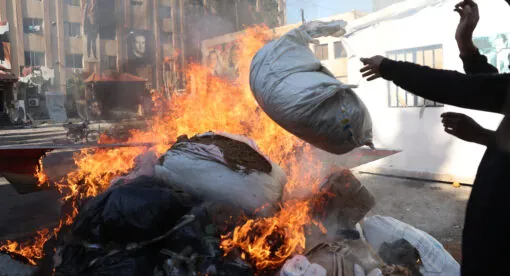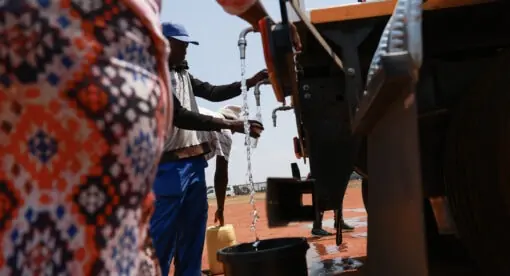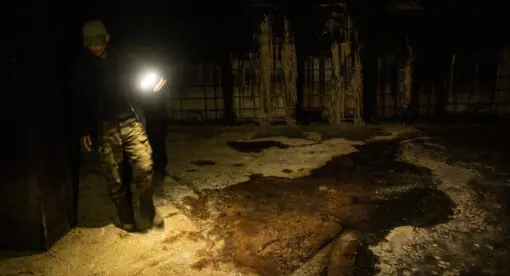Reading Russian President Vladimir Putin’s mind is notoriously difficult. Western analysts are invariably struggling to assess whether and why Moscow could order an attack on Ukraine. With Russian national security policy, Putin does not decide everything, but he can decide anything — and the question of war or peace is so important that Putin, while listening to his advisers and considering the views of key Russian interest groups, would have the final say. Many Western goals are also at issue for policymakers, including the fate of liberal democratic principles in Europe, the future of NATO, Western credibility, and the challenge of not further deepening Sino-Russian ties. Yet their dilemma is that steps taken to counter one motivation may not negate another — and may counterproductively spur incentives for Russia to attack.
Scenario 1: Conquered Ukraine
Moscow may undertake a massive military attack against unoccupied Ukraine to eliminate the country as an independent state. Launched from Russian and Belarusian territory as well as Crimea and the Black Sea, its goal would be to annex all or most Ukrainian territory. The Kremlin might try to decapitate the current Ukrainian government and replace it with a puppet regime under the leadership of pro-Moscow politicians who would restore Russia as Ukraine’s leading economic and security partner while confirming Russia’s annexation of Crimea. Moscow might pursue regime change by encouraging a pro-Russian faction to seize power, declare itself the legitimate government of Ukraine, and call on Russia to send in forces in its defense. Russian analysts might optimistically expect that some early victories would lead to the collapse of the Ukrainian military, as in 2014 or 2008.
Putin has lamented the Soviet Union’s disintegration. He has depicted ethnic Russians, Ukrainians, and Belarusians as a common Slavic nation — a larger “Russian World” artificially divided by the West and their local lackeys. The Russian president may also be considering his legacy as the restorer of lost Russian lands. Due to genuine or feigned emotional outrage, Putin also depicts Ukraine’s independence as an insult and threat to Russia. Besides its ideological value, adding more Ukrainian territory and people could augment Russia’s demographic power and economic resources as well as provide forward bases for further conquest. Despite the high near-term economic and human costs of an invasion, these could decline in a few years after Ukraine is pacified and the West relaxes its sanctions.
Scenario 2: Subservient Ukraine
A more limited Russian goal would be to launch a preventive war against Ukraine to keep the country weak and under Moscow’s control. The motivation would be to exploit Russia’s current overwhelming military superiority to inflict a devastating blow against the Ukrainian armed forces, depriving Ukraine of the capacity for independent self-defense in the future and leaving it decisively vulnerable to renewed Russian military operations. With Moscow having recently strengthened its security position in Central Asia and the South Caucasus, restoring Russia’s predominant influence in Ukraine would further enhance its sphere of influence in the former Soviet republics. Even if the Ukrainian government remains formally independent, a major defeat would underscore Ukraine’s internal weakness, widen divisions with foreign partners, and keep Ukraine out of NATO and NATO out of Ukraine for years.
One reason Russian leaders might attack now would be to avert Ukraine’s becoming stronger over time. Ukrainians have recovered from their 2014 defeat and strengthened their national political institutions, economic resources, and ties with the West, including NATO and the EU. The Ukrainian armed forces are acquiring better drones and missiles to combat Russian forces and even strike into Russian territory. A prosperous and powerful Ukrainian state aligned with Western values and institutions could present an attractive alternative to Russians living in an authoritarian autocracy alienated from the West and subservient to China. Due partly to Russia’s seizure in 2014 of some of the most Russian-oriented territories and Moscow’s continued hostility, the Ukrainians remaining in the unoccupied territories have adopted more pro-Western views.
Russia’s previous means of indirect control of Ukraine through pro-Moscow politicians, businesses, and media combined with payoffs and kompromat no longer work. To Moscow’s chagrin, the more powerful and less docile Ukrainian government wants to revise some of the provisions that Russia forced upon Ukraine in the 2014 and 2015 Minsk agreements. Additionally, European dependence on Russian gas imports will become less of a restraint on NATO support for Ukraine as Europe finds alternative energy sources.
Russian policymakers may decide that, having used military power to weaken Ukraine in 2014, they should employ force again now to exploit their fleeting advantages rather than risk losing the capacity to conquer Ukraine militarily altogether. The Russian military might accordingly try to seize critical industrial areas of Ukraine, spur massive refugee flows to generate humanitarian pressure, and sustain a long-term deployment of Russian forces in Belarus and eastern Ukraine as a permanent knife at Ukraine’s throat. Russia could also strive to enlarge the territory and secure formal recognition by Kyiv of the Russian-controlled enclaves of the so-called Donetsk People’s Republic (DNR) and Luhansk People’s Republic (LNR). Russia might also try to cut Ukraine’s access to its Black Sea ports by occupying its southern coast. Empowering these and other regions would enfeeble the central government and give Moscow future opportunities to exploit Ukrainian cleavages.
Scenario 3: Break the Bloc
Russia might also attack Ukraine to catalyze a transformation in the European security order and enhance Moscow’s position while weakening the Western bloc. This objective would be broader than Ukraine but achieved through Russian military action in Ukraine. The goal would be, at a minimum, enforcing a “Putin Doctrine” of no additional NATO members or alliance activities in the former Soviet republics. A more ambitious objective would be to undermine the alliance’s credibility by highlighting its failure to protect partners, thereby enhancing Russia’s relative position in Europe.
Russian officials have evinced intense anxiety about NATO’s activities along Russia’s western frontier. Putin rails about alleged Western pledges not to expand its membership into the former Soviet bloc, claiming that NATO “duped” Moscow in the 1990s and now exploits Ukraine’s anti-Moscow stance to weaken Russian power in Europe. Last December, the Russian government published draft security treaties Russia had presented to NATO and the United States that barely mentioned Ukraine. Its main clauses would require NATO governments to exclude any further membership enlargement, end military ties with the former Soviet republics except for the Baltic states, and remove foreign military architecture from the territories of NATO members that joined the alliance following the May 1997 Russia-NATO Founding Act. Russian leadership might expect that a successful Russian military operation in Ukraine would weaken the credibility of NATO security guarantees, already atrophied by the non-enforcement of the pledges to Ukraine made in the 1994 Budapest Memorandum and by the 2021 military withdrawal from Afghanistan.
Scenario 4: Enhance Negotiating Leverage
Russia might also be increasing the risk of war to compel the Ukrainian government and NATO countries to make concessions to Moscow. The past few months have seen multiple Russian demands, deadlines, requirements, red lines, and threats for non-compliance. The goal would be to improve Moscow’s position in Ukraine and the European security sphere through risk taking rather than kinetic action, thereby avoiding potential military and economic costs, such as additional sanctions and a massive insurgency. Russian escalatory steps would seek to make the threat of force credible to alter the cost-benefit calculus of Ukrainian and Western decisionmakers, through means such as exploiting a war scare to hurt Ukraine economically by discouraging foreign investment and encouraging panic buying. Russia would combine efforts at intimidation with proffered off-ramps if its demands were met. In essence, the Kremlin would aim to get rewarded for solving the crisis it created by threatening an attack it does not intend to execute.
Within Ukraine, Moscow would want the government to execute Russia’s interpretation of the 2014 and 2015 Minsk Agreements, including recognizing the special status of the DNR and LNR. Other demands to Kyiv might include withdrawing Ukrainian forces from the Line of Contact by creating a demilitarized buffer zone, acknowledging Moscow’s annexation of the Crimean Peninsula, and relaxing restrictions on the activities of Ukraine’s pro-Moscow politicians, media groups, and business entities. Beyond Ukraine, Russian diplomats would want NATO to agree to arms control measures, the EU to limit sanctions and allow the Nord Stream 2 pipeline to enter operation, and Western governments to constrain security ties with Ukraine.
Western Dilemmas
The United States and its allies can best manage the last three above scenarios. Western countries have engaged in three decades of competition with Moscow for influence in the former Soviet republics. Any increase of Russian influence in Ukraine would likely prove as transient as early gains. Additionally, Moscow’s alienation from the current NATO-dominated European structure is longstanding. Effective U.S. leadership in partnership with European partners should sustain the Euro-Atlantic alliance no matter what Moscow does. Recent Russian belligerence has if anything strengthened NATO around its core collective defense mission. Similarly, negotiating Western security-building measures with Moscow has a long if not trouble-free history; constraining Russian military activities might prove sufficiently valuable to warrant comparable limits on NATO actions.
The most dangerous scenario would be a major Russian invasion of Ukraine. Even if it failed to conquer the entire country, the assault, which could be the largest military operation in Europe since World War II, would generate horrendous human, economic, and other costs. The challenge for Western policymakers is that strategies and tactics optimized to avert this or any other single scenario could be less useful, or even counterproductive, in another. For example, augmenting Ukraine’s military potential should deter Russian expectations of an easy military conquest but could spur preparations for a preventive war. Reinforcing force deployments in NATO’s eastern members would deter Russian adventurism against them and reassure other allies but could reinforce Moscow’s determination to build a countervailing military bloc of Eurasian states. Offering arms control deals would appeal to Putin if he aims to haggle but encourage belligerency if his goal is to enervate NATO and establish a new European security order rather than codify the existing one.
One advantage of the current multipronged Western approach — combining deterrence, defense, and diplomacy, with the latter engaging multiple Western leaders — is that it hedges against several scenarios. Policymakers should strive to avoid prematurely focusing on one approach and constantly keep in mind how their actions could generate unexpected outcomes given the Kremlin’s deliberately masked motives.
Richard Weitz is a Senior Fellow and Director of the Center for Political-Military Analysis at Hudson Institute. Before joining Hudson in 2005, Dr. Weitz worked for several other academic and professional research institutions and the U.S. Department of Defense. His current research includes regional security developments relating to Europe, Eurasia, and East Asia as well as U.S. foreign and defense policies. In addition to many articles and op-eds, Dr. Weitz has authored or edited several books and monographs, including The New China-Russia Alignment: Critical Challenges to U.S. Security (2022); Assessing the Collective Security Treaty Organization; Promoting U.S.-Indian Defense Cooperation; China and Afghanistan After the NATO Withdrawal; Turkey’s New Regional Security Role: Implications for the United States; War and Governance: International Security in a Changing World Order; The Russian Military Today and Tomorrow; Global Security Watch—Russia; and two volumes of National Security Case Studies for the Project on National Security Reform. He tweets at @RichardWeitzDC.
The views expressed in this article are those of the author and not reflective of an official policy or position of the New Lines Institute.






